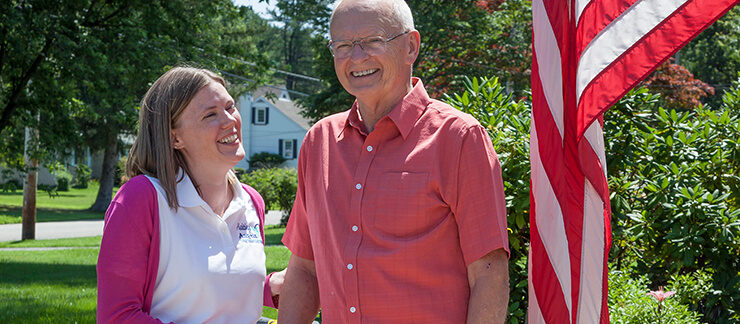
Elder Care Strategies for Visually Impaired Seniors
When a loved one begins to lose their vision, they often rely on the support and assistance of caregivers to help them manage visual impairment. But if you don’t have experience with vision loss or blindness, it can be difficult to know the best way to provide elder care for a loved one who is suffering from low vision.
At Visiting Angels, our home care providers regularly work with seniors suffering from visual impairment. Our caregivers rely on a number of elder care strategies that are specifically meant for visually impaired seniors. These strategies help reduce the risk of injury for seniors with low vision and make day-to-day life easier to navigate.
Senior Fall Prevention & Visual Impairment
Helping seniors avoid falls is always a big part of elder care. But when a senior is visually impaired or legally blind, the risk of falls becomes much greater. Family elder care providers for seniors with low vision need to be especially careful to reduce the risk of slipping, tripping, and falling around the home.
If your loved one still has partial vision, there are steps you can take to make it easier for them to see their surroundings and avoid risky areas. Consider replacing lights around the home with higher-wattage fixtures and bulbs to make the space brighter. You might also want to install new lights in dark areas or spots where your loved one is at a higher risk for fall or injury, such as stairs. You can also make stairs easier to see by applying brightly-colored tape along the lip of each step.
You will also want to eliminate tripping and slipping risks. This means getting rid of clutter, keeping cords out of the way, removing rugs that could be tripped over, and applying a non-slip coating to tile floors. You should also encourage your loved one to wear rubber-soled shoes with strong grip.
Aids & Activities for Seniors with Vision Loss
In addition to keeping your loved one safe, providing elder care for a family member with vision loss also means keeping them happy and comfortable. Unfortunately, vision loss can make favorite activities and day-to-day living much more difficult. As a caregiver, you can help your loved one cope with visual impairment by accommodating their vision loss in day-to-day life.
One of the simplest ways to do this is by helping your loved one learn about possible vision aids. You can also provide them with products that make it easier to cope with vision loss, such as books with oversized print or large screen TVs with high contrast images.
You can also help them keep their home organized so that it’s easy for them to find items by memory or touch. In most cases, it is best to keep things where your loved one already knows they belong. But in some cases — like a cluttered cutlery drawer — it can be better to organize items so that your loved one can easily pick things out by touch.
Elder Care for Vision Loss
As an elder care provider for a visually impaired senior, you might also be called on to help with everyday tasks. Your loved one’s visual impairment might prevent them from being able to cook, clean their home, do laundry, or any number of other activities. It might also mean that they rely on you for shopping and errands.
If you can’t always be there for your loved one, you might also consider professional elderly companion care services. At Visiting Angels, our caregivers regularly work with visually impaired seniors, offering a helping hand and fresh set of eyes around the home. Your local office will be happy to discuss care options with you to find the right care plan for your loved one.
For a free in-home elder care assessment, call your local home care agency today.


